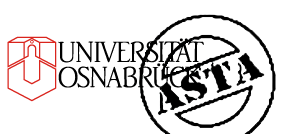Webcampflicht juristisch nicht haltbar - und was jetzt?
Gespeichert von Referat für Öff... am/um Di., 27.07.2021 - 12:23

Seitdem wir unseren Post zur Webcampflicht in Onlineklausuren veröffentlicht haben, sind bei uns einige Anfragen von Student*innen eingegangen, was genau das jetzt für sie und ihre Klausuren bedeutet. Darum wollen wir an dieser Stelle einige der häufigsten Fragen klären.
1. Wir bleiben bei unserer Einschätzung. An der Universität existiert keine rechtsbindende Prüfungsordnung, die den Einsatz von Webcams in schriftlichen Onlineklausuren regelt. Der Verweis auf irgendwelche Handreichungen oder Empfehlungen für online Klausuren ist nicht ausreichend, da solche Dokumente eben keinen rechtsbindenden Charakter aufweisen. Zu dieser Einschätzung sind wir nach einer Rücksprache mit einem entsprechenden Fachanwalt gekommen.
2. Einige Prüfer*innen scheinen auf den §26a der Allgemeinen Prüfungsordnung (APO) zu verweisen, ein Dokument welches potenziell solch einen rechtsbindenden Charakter hätte, und meinen, dort würde ja alles entsprechende zu Webcams in Onlineprüfungen geregelt. Tatsächlich findet sich dort jedoch nur eine explizite Regelung zur Bild- und Tonübertragung bei mündlichen Prüfungen. Eine entsprechende Regelung zu schriftlichen Klausuren findet sich hier nicht.
3. Scheinbar gibt es auch Verweise auf angebliche spezifische Fachregelungen. Die entsprechenden Fachprüfungsordnungen verweisen jedoch in der Regel bei Prüfungsangelegenheiten nur auf die APO oder auf Textstellen, die genau wie in der APO formuliert sind. Sollte euch also diese Argumentation entgegen gebracht werden oder ihr einen Studiengang studieren, der nicht durch die APO geregelt wird, schaut in eure entsprechende Fachprüfungsordnung und schaut euch an, wie Prüfungen geregelt werden. Findet sich auch hier kein expliziter Verweis auf eine Webcamnutzung im Kontext von Klausuren, existiert auch auf Fachebene keine rechtsbindende Grundlage für eine Kamerapflicht. Die APO findet ihr zum Vergleich hier https://www.uni-osnabrueck.de/fileadmin/documents/public/ordnungen/Allgemeine-PO-Bachelor-Master_2020-06.pdf
Uns ist bewusst, dass all dies Wissen leider bei vielen Dozent*innen nicht gereicht hat, um von einer Prüfung mit Webcamnutzung abzusehen. Daher fragen sich sicherlich viele von euch, was genau ihr jetzt tun könnt und ob ihr dann diese Klausur einfach ohne Kamera schreiben sollt. Wir raten euch auf jeden Fall, dass ihr euch mit anderen Mitstudierenden zusammen tut und euch gemeinsam oder durch eure Fachschaft an die entsprechende lehrende Person wendet. Durch eine gemeinsame Argumentation könnt ihr deutlicher machen, dass es nicht nur einzelne Personen sind, die ein Problem damit haben. Solltet ihr auch dann keinen Erfolg haben, steht euch immer noch der Weg offen, unserem Referat für Studium und Lehre unter astasl@uos.de eine Mail zu schreiben. Unsere Referentinnen unterstützen euch gerne bei eurer Argumentation und können auch versuchen Dozent*innen noch zum Einlenken zu bewegen. Aber natürlich gibt all dies keine 100 %ige Sicherheit dafür, dass für die Klausur keine Webcam verlangt wird, sodass die ursprüngliche Frage bleibt, ob ihr die Klausur denn dann einfach so schreiben oder euch weigern solltet, die Kamera anzuschalten. Wir können und wollen euch diese Entscheidung natürlich nicht abnehmen, aber wir können euch darstellen, wie es im Falle des Falles weitergehen könnte.
Wenn ihr euch also entscheiden solltet auf eine Klausur ohne Webcam zu bestehen, kann es sein, dass euch der*die Dozent*in dann von der Klausur ausschließen möchte. In diesem Fall empfehlen wir euch noch einmal, auch hier wieder mit möglichst vielen Personen auf die fehlende rechtliche Regelung hinzuweisen und dass ihr ein Recht habt, diese Klausur auch ohne Webcam mitzuschreiben. Sollte dies den*die Dozent*in nicht überzeugen und ihr werdet von der Klausur ausgeschlossen, würde euch der Klageweg offenstehen. Das heißt, ihr könntet juristisch gegen diese Entscheidung vorgehen. An dieser Stelle jedoch direkt der Hinweis, dass sich so eine Klage durchaus einige Zeit hinziehen könnte, beachtet dies also auf jeden Fall, wenn ihr euch für so einen Weg entscheiden solltet.
Auch wenn wir euch die Entscheidung, wie ihr euch verhalten wollt, nicht abnehmen können, versichern wir euch, euch im Zweifelsfall zu unterstützen. Das heißt wir können einen Kontakt zu entsprechenden Anwält*innen herstellen, gegebenenfalls einige Kosten übernehmen und den Fall hochschulpolitisch und öffentlich skandalisieren.
Außerdem ist und bleibt dieses Thema weiterhin für uns relevant. Wir sehen nach wie vor keine Sinnhaftigkeit in der Nutzung einer Kamerakontrolle in Klausuren und appellieren erneut an Dozent*innen, auf eine Webcamüberwachung in Klausuren zu verzichten! Es gibt genügend positive Beispiele aus vielen Fachbereichen, die belegen, dass auch mit alternativen Prüfungsformen wie Open Book Klausuren und ohne Webcams faire und aussagekräftige Prüfungsleistungen erbracht werden können.
Für Rückfragen, Hilfestellungen und Kritik stehen wir gerne zur Verfügung.
---English Version---
Since we published our post on compulsory webcams in online exams, we have received a few inquiries from students about what this means for them and their exams. That is why we want to clarify some of the most common questions at this point.
1. We stick to our assessment. There are no legally binding examination regulations at the university that regulate the use of webcams in written online exams. The reference to any handouts or recommendations for online exams is not sufficient, since such documents are not legally binding. We came to this conclusion after consulting a specialist lawyer.
2. Some examiners seem to refer to §26a of the General Examination Regulations (APO), a document which could potentially have such a legally binding character, and believe that everything relating to webcams in online exams is regulated there. In fact, there is only an explicit regulation for the transmission of images and sound in oral exams. There is no corresponding regulation for written exams here.
3. Apparently there are also references to alleged regulations within the specific courses of study. However, these examination regulations usually only refer to the APO or to text passages that are formulated exactly as in the APO. So if you are presented with this argument or you are studying a course of studies that is not regulated by the APO (these are all courses that have their own examination regulations in which they don't refer back to the APO), take a look at your respective examination regulations and see how examinations are regulated If here, too, there is no explicit reference to webcam use in the context of exams, there is also no legally binding basis for a camera requirement at the specialist level. For comparison, you can find the APO here https://www.uni-osnabrueck.de/fileadmin/documents/public/ordnungen/Allgemeine-PO-Bachelor-Master_2020-06.pdf Sadly this is in German, if you need help, you can contact us at astasl@uos.de.
We are aware that all this knowledge was unfortunately not enough for many lecturers to refrain from demanding webcam use in their exams. Therefore, many of you are certainly wondering what exactly you can do now and whether you should then just write this exam without a camera. In any case, we advise you to team up with your fellow students or your student body and to contact the relevant lecturer. By arguing together, you can make it clearer that it is not just individual people who have a problem with it. If you are still unsuccessful, you can write an email to our department for studies and teaching at astasl@uos.de. Our members will be happy to support you with your argumentation and can also try to persuade the lecturers to give in. But of course none of this gives 100% certainty that no webcam is required for the exam, so the original question remains whether you should just write the exam or refuse to turn on the camera. Of course, we cannot and do not want to make this decision for you, but we can show you how it could go on if it should.
So if you should decide to take an exam without a webcam, the lecturer may threaten to exclude you from the exam. In this case, we recommend you once again to point out the missing legal regulation together with as many people as possible and that you have the right to write this exam in this way. If this does not convince the lecturer and you are excluded from the exam, you would be able to take legal action. That means you could sue against this decision. At this point, however, be aware that such a lawsuit could drag on for some time, so be sure to consider this if you should decide on such a path.
Even if we cannot make the decision of how you want to behave for you, we assure you that we will support you in case of doubt. This means that we can establish contact with appropriate lawyers, take over some costs if necessary and scandalize the case within the university committees and publicly.
In addition, this topic is and will continue to be relevant to us. We still do not see any sense in the use of camera control in exams and again appeal to lecturers to to renounce webcam monitoring in exams! There are enough positive examples from many departments that prove that alternative forms of exams such as open book exams can be used to achieve fair and meaningful exams without the use of webcams.
We are happy to answer any questions, receive your criticism or help you.
